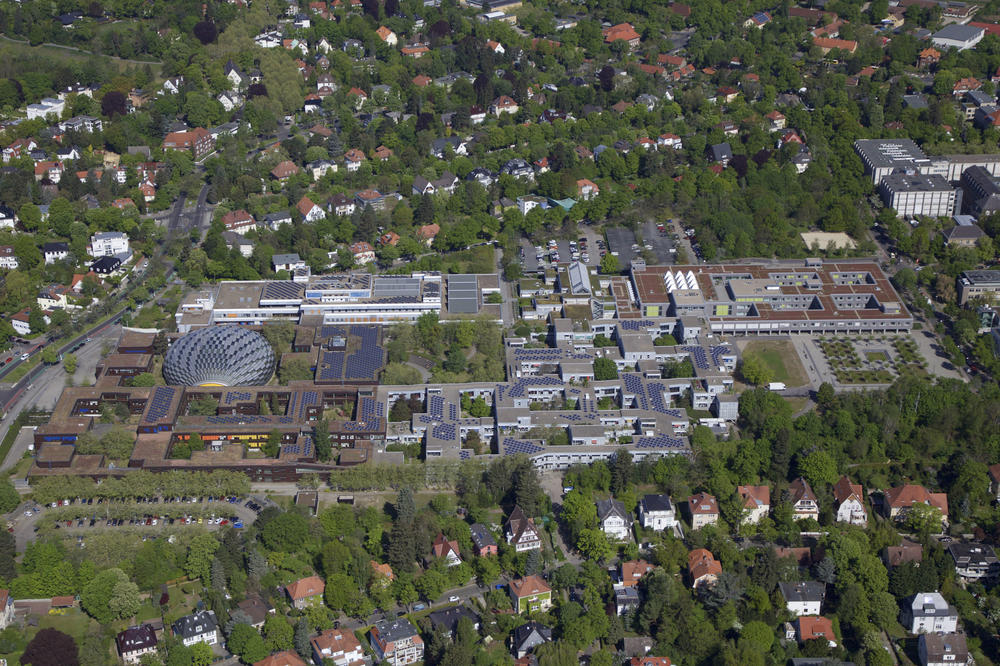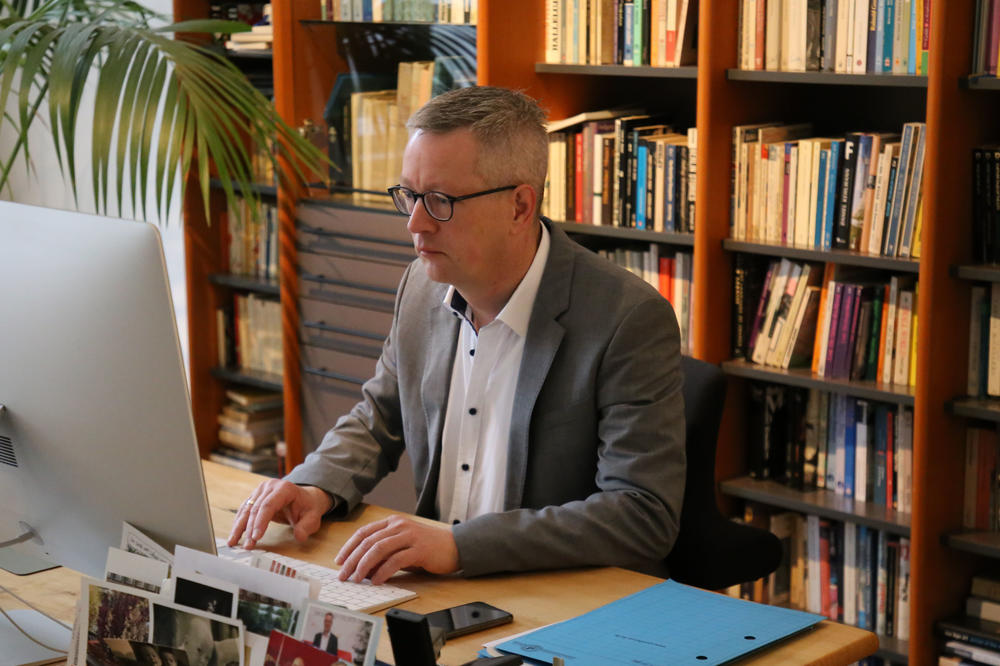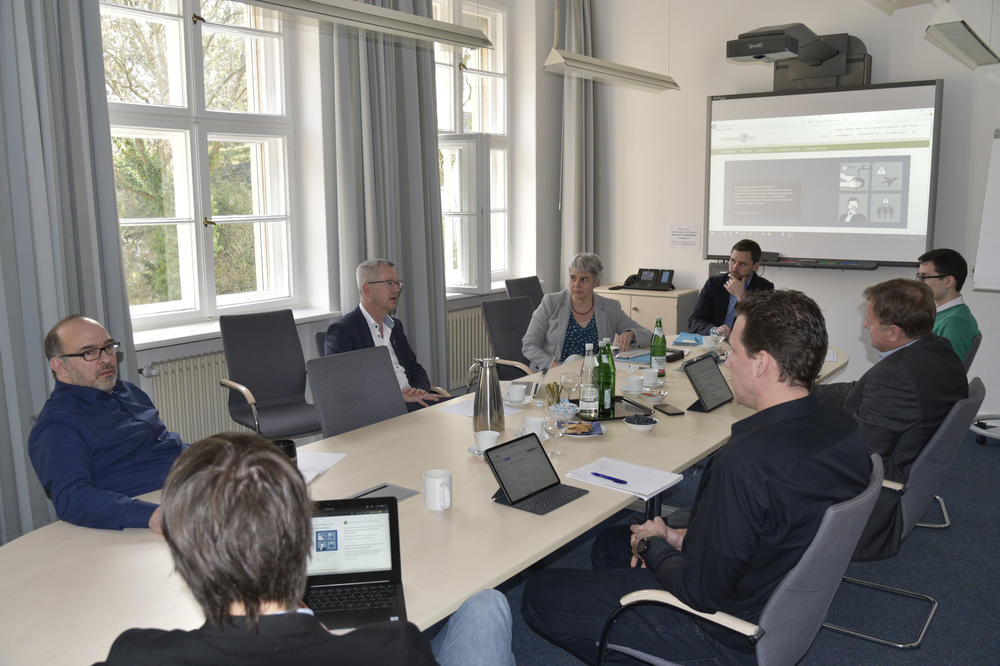“With Dedication, Flexibility, and Creativity”
President of Freie Universität Berlin, Professor Günter M. Ziegler, talks about reducing on-site operations at the university and how we might grow out of this difficult situation.
Mar 23, 2020
Exceptional times call for exceptional measures: As of Friday, Freie Universität Berlin is reducing on-site operations to a minimum.
Image Credit: Dirk Laubner
Society as a whole is being called upon to act in order to contain the spread of the novel coronavirus, which means Freie Universität Berlin also has new and serious problems to tackle. In conjunction with Berlin’s other universities, it supports the measures agreed upon by the German federal government and the Berlin Senate. In order to facilitate social distancing, in-person coursework and exams have been suspended, the libraries are closed, and research operations scaled down significantly.
The time has come to protect the university’s students, researchers, administrative staff, and visitors from infection as much as possible and thus help limit the spread of the virus in Berlin. Freie Universität Berlin continues to provide up-to-date information on its website regarding safety measures and how regular on-site operations are transitioning to digital formats for teaching, research, and administration. Campus.leben magazine spoke with the President of Freie Universität, Günter M. Ziegler, about the university’s current situation in the midst of the coronavirus pandemic.
Professor Ziegler, as the president of a university you and the rest of the Executive Board are responsible for a large number of people: for students, who want to graduate on time; for researchers with projects that suffer from interruptions; and for administrative employees, who keep the university and its many departments running and its infrastructure intact. What are some of the biggest challenges at the moment?
Right now, it is important that we set the proper priorities – we must act responsibly in response to this incredibly fast-changing situation. The first priority is to limit the spread of the coronavirus as best we can. Our second priority is to ensure that we can continue the university’s core activities – research and education – albeit under different circumstances. Since pandemic measures have to be effective and expedient, we can’t let our guard down and be satisfied with well-intentioned, but hasty decisions that do not fulfill their purpose.
Professor Günter M. Ziegler, President of Freie Universität, is also working remotely from home.
Image Credit: Maik Machals
Obviously, some of the goals you mentioned pose a contradiction of interests between individual pursuits and the wellbeing of society.
For example, many students want to continue with their studies or are just about to graduate. In order to do so, they need to take exams or complete a Bachelor’s thesis. But they need books from the libraries to do that.
Employees want to do their part to make sure that university operations keep running and that the summer semester can start, but at the same time, we as individuals all bear a great responsibility toward ourselves and the community, toward our colleagues, our families, and our friends to make sure that as many of us as possible stay healthy.
That said, I do not see a conflict here at our university. On the contrary, everywhere I look, I see people behaving with caution, in groups or individually. They are setting aside their personal interests and taking responsibility in order to help Freie Universität pursue the main goal right now: containing the spread of the coronavirus. That is an amazing thing to witness.
The safety measures decided upon by the Berlin Senate together with Freie Universität Berlin and the other universities in Berlin affect students, researchers, and employees. In-person courses have been suspended. Research operations are being reduced. What can Freie Universität employees in research units, laboratories, libraries, or other services expect given the current situation? How can administrative operations continue to run smoothly?
Our plan to keep things going involves transitioning to minimal on-site operations. That means we will maintain Freie Universität Berlin as a place of study, education, and research and concentrate our efforts on preparing for the summer semester. But there will be lots of changes: contact will be mostly virtual and social interaction limited. Only employees whose physical presence is absolutely necessary will come to work on campus.
We probably cannot achieve this without some disruptions – but we can approach the challenge with dedication, flexibility, and creativity: dedication from our desks at home; flexibility in how we arrange our work spaces; and creativity in thinking up digital solutions.
No institution is adequately prepared to respond to a situation of this historic magnitude and all the questions it brings up, not even us at Freie Universität. On the other hand, I and the entire Executive Board are impressed by the way the members of the university are pulling together in these times – the administrative heads, the building managers and custodians, the researchers and student employees. Research support staff members are also showing how vital their work is to keeping research operations going. Once again, I would like to express my immense gratitude to all the members of Freie Universität!
How are department heads and the Executive Board communicating with each other? Are there specific people in the various departments and units who have been designated as contact persons for this purpose?
The Executive Board quickly put together a task force with as little bureaucracy as possible. It convenes daily with meetings often going late into the night. The group is led by our Vice President in charge of collaborations with Charité – Universitätsmedizin Berlin, Hauke Heekeren, who is himself a doctor and neuroscientist. In this leadership role, Professor Heekeren is in constant contact with me, Andrea Bör, the University Provost, and Emanuel Koulouris, the Head of the Executive Coordinating Office.
Working with the task force are four teams, each with a special focus ranging from digitalization to education and exams. These teams bring together the heads of administrative divisions, central offices and institutes, as well as the administrative heads of the departments, who then work together closely on their specific topic.
They are identifying important issues, developing solutions, and communicating regularly with other departments and units, even though meeting in person is not possible at the moment. For example, the administrative head of a department has to coordinate with the dean’s office to establish what “minimal on-site operations” entails for their area specifically – it will mean something quite different for the people working in veterinary medicine versus those in the university libraries or humanities departments.
It is a good thing that Freie Universität has always placed value on the departments and other decentralized units having a great deal of autonomy. That independence has allowed them to develop strong organizational structures that meet their specific needs. These structures are proving incredibly helpful as we work to coordinate short-term solutions between the centralized and decentralized units that are tailored to the departments’ unique requirements. That means – and this is really something to be happy about in times like these – we are all working toward the same goal: supporting our university.
The start of the summer semester for Berlin’s universities has been moved back to April 20. How certain are you of that date?
The semester is going to start on April 20. We will be prepared. But one thing is already certain: It won’t be business as usual. We won’t have crowded lecture halls or intensive group work in small seminar rooms. Instead, we are looking at online courses, virtual seminars, using chats to ask questions, conference calls for class discussions, and much more. A lecture via Twitter is already in the works.
There will also be a lot of work to do offline with a stronger focus on working with books and scripts. We will have to be creative, but that is something we’re good at here at Freie Universität. It is part of who we are, going back to the founding of our university. This bizarre and unique situation is also an opportunity for us to generate new ideas.
If there is something positive to be gained from this whole ordeal at our university, then perhaps this: We now have to ask ourselves hard questions, like what do teaching and learning really mean? What defines a university (in desperate times)? And what defines this university in particular? – And finding answers to these questions will require intensive, critical work.
What advice do you have for students, researchers, and employees at Freie Universität during these times?
Read. Write. Make phone calls. Use video conferencing. The phone: It is our means of keeping in touch, even if it is not physical. Writing: I hope that 2021 sees a lot of groundbreaking books and innovative approaches to education coming out of Freie Universität – or rather out of the home offices of Freie Universität’s members.
And even though this is a serious situation, we should also allow ourselves to find inspiration and encouragement where we can. That’s when I go to my bookshelf and pick up Kurt Tucholsky, Robert Gernhardt, or Max Goldt, just to name a few. And what if we decided to extend the successful “One University, One Book” project that had us all reading Adolph Freiherr Knigge’s On Human Relations. Now, the corona crisis has us thinking hard about human relations and in some cases adjusting how we relate to each other.
Please stay healthy!
Christine Boldt conducted the interview.
The original German version of this article was published on March 20, 2020, in campus.leben, the online magazine of Freie Universität Berlin.



